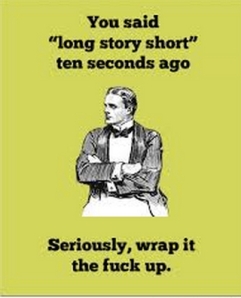Penny Dreadful: How To Stop Sucking At Storytelling

They tell me that a lot of people have been asking about my session at the Social. Sourcing. Talent. (#SST2014) conferences, “Using Your Blog To Tell Your Story.” So, they asked me to write a post on it. No pressure. But it’s kind of hard to write a promotional post for a topic with that title without sounding like a totally pretentious douche canoe.
This has rarely stopped me before, but writing about writing is self-indulgent – which, mixed with the intrinsic self-promotion of previewing a presentation I’m going to give likely won’t incentivize any registrants, which I suppose is the purported purpose of this post.
Here’s the really frustrating thing: I’m not 100% sure that you’re going to be able to actually get anything out of attending this session. In fact, I agree with Gore Vidal, who held to the belief that you can’t train yourself to be a writer – it’s a talent that you either have, or you don’t. And if you don’t, all the quantity in the world can’t compensate for quality when it comes to outcome.
At least, that’s how I try to justify my relatively low output as a professional blogger. I just don’t see the need to write every damn day just to fill the increasingly voracious appetite for blog content – the penny novel of the Internet Age.
4 Matt: Because It’s Not a Blog Without A Numbered List
 #1: Don’t Write Because You Have To. Write Because You Have Something To Say.
#1: Don’t Write Because You Have To. Write Because You Have Something To Say.
That takes us to rule #1: don’t put your byline by mediocre content just because it looks good to post every day.
#2: Say What You Want To Say Or Don’t Say Nothing At All
OK, so now that we’ve removed the volume requirement, here’s the content Catch-22: the longer it takes you to write something, the worse it probably is. Your best stuff comes out quickly because there’s passion behind the post, and when you actually care about something enough, it practically writes itself.
That rarely happens, but that’s why you shouldn’t write unless you thin that someone actually wants to read it. If you’re writing just to have content and don’t care about the context of its consumption, then you’re blog is something that no one wants to write or read. What the hell is the point of that?
Even more mind boggling is when these business blogs try to give an opinion or make a point. This is often justified by back-linking to some other blogger’s earlier post on the exact same topic you’re tying to cover or citing data from a vendor-sponsored “white paper” (57% of which are total fiction in the first place).
Remember, they’re making stuff up – and you can do that too. Ditch the specious citations (although I appreciate the backlink love, y’all) – and actually say what you think, not that you think your non-existent audience of current and potential leads thinks you should think. To have a voice, you need to actually have something to say.
Which means everything starts with a beginning, and the beginning of everything should be your story.
#3: Know Your Story
I hate it when people use words like “authenticity” and “transparency” around, terms almost unequivocally used in marketing messaging, no little irony given that these commoditized concepts only appear when pitching a product. The concepts behind these buzzwords, though, are everything.
I can’t tell you how to capture your story, or what’s worth sharing. But it should inform everything you blog about, and you should blog with a definite agenda. Bias is OK, as long as it’s informed by real experience from a real person using their real voice. And parallel syntax, when possible.
Getting to the heart of your story can be difficult, but it’s going to be the main topic I’m going to talk about in Sydney, Melbourne and Auckland (goodonya), and what I hope you can walk away with a little awareness about. It’s going to be an interesting exercise, more participatory than didactic, since I can’t teach writing, nor write your story for you.
The goal, instead, is going to be getting the good stuff that we all have out, and learning to cut through the crap to produce content that’s worth reading and writing.
Here are the 5 key talking points that are going to guide the discussion Down Under:
- Why Are You Writing
- Who Are You Writing For?
- What Makes Your Writing Worth Reading?
- What Should You Write About?
- How Should You Publish And Promote Your Writing?
Ultimately, answering these 5 questions honestly – as we’re going to cover as a group at #SST2014 – are going to govern not only what to say, but where and how to say it – and how to separate your stuff from the fluff. Which, speaking of, brings us to our final main point:
#4: Avoid Numbered Lists
They suck.
Originally posted at the ATC Event blog
If you come from a Land Down Under or don’t eat Kiwi because it’d be cannibalism, join me at the Social Sourcing Talent Conferences (#SST2014) in November. I’ll be walking about Sydney, Melbourne and Auckland to talk about some of the things that matter most for sourcing success: engagement, storytelling, inbound marketing and more.
Click here to register (and good on ya).

As with a real slots machine, you can choose the number of lines and bet to win certain combinations.
The game is remarkably like many computer-based MMOs, including fleshed-out character creation, numerous
character abilities, an open world and tons of loot-based rewards.
As a careful guess, at the end of 2013 there will be more tablets users than the PC users.